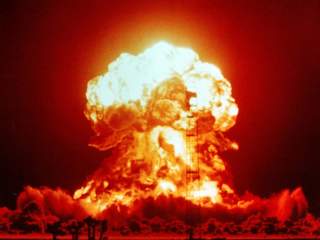When a Collapsing, Paranoid North Korea Turns to Nukes. . .
Does the logic of deterrence extend to a dying regime?
In the end, a collapsing North Korea might not use nuclear weapons, especially against the United States, since doing so would turn an already bad situation into one that is even worse by guaranteeing retaliation by affected parties. After all, the Soviet Union, a nuclear weapons superpower, collapsed quietly. But North Korea is not the Soviet Union of the 1980s and early 1990s, and Kim Jong-un is no Mikhail Gorbachev. The U.S.-North Korea relationship is unlike the U.S.-Soviet relationship in that Washington and Pyongyang have no official channels of communication and have virtually no means to manage crises. Moreover, as former Secretary of State James Baker recounts, “[t]he Cold War really did not have to end peacefully—it could have ended with bang instead of a whimper.” Ending the nuclear rivalry peacefully took wisdom and political courage, from then President George H. W. Bush, who refused to dance on the Berlin Wall as it was crumbling, as well as Gorbachev, who did not take a confrontational stance. Given the internal situation in North Korea and political climate in the United States, coupled with the current state of U.S.-North Korea relations, the Kim regime’s collapse might not end with a whimper.
Therefore, the possibility of a collapsing North Korea using nuclear weapons, no matter how remote, should bring U.S. policy makers to imagine the following scenario and ask a politically uncomfortable question. Suppose that North Korea in the future demonstrates that it has deliverable nuclear weapons that can hit the United States, produces enough in quantity and has them dispersed and protected on different platforms to survive preemptive strikes. Building up missile defense systems against North Korean missiles might help, but would not guarantee, security in a setting in which failing to stop one nuclear missile might mean the deaths of millions. Achieving this level of capability seems to be the Kim regime’s ultimate objective, given North Korea’s constant nuclear and missile tests, including attempts to diversify the types of platforms for launching nuclear-tipped missiles, for example, from submarines. If the Kim regime achieves its goal, should the United States come to terms with North Korea as a nuclear-weapons state and seek détente, if not rapprochement, just as Washington had done with Moscow under Richard Nixon and Henry Kissinger?
One way to reduce the dangers emanating from a potential North Korean collapse scenario would be to come to terms with North Korea as a nuclear-weapons state and establish channels of communication and a working relationship to manage crises. Doing so would be handing the Kim regime exactly what it wants. The regime wants to present a nuclear fait accompli to the United States. But would a responsible U.S. policy maker, with potentially millions of American lives at stake, have a choice if North Korea develops a secure, deliverable nuclear deterrent?
The preferred solution would be that the United States and its allies wave a magic wand to remove the Kim regime or prevent North Korea from obtaining a secure nuclear deterrent able to hit the United States in the first place. Yet successive U.S. administrations have tried everything from diplomacy to pressure tactics to no avail, while the Obama administration is understandably stuck with “strategic patience,” which is essentially a “do little and hope for the best” policy. Under the current circumstances, U.S. policy makers face two scenarios. In the first, North Korea collapses before obtaining secure, deliverable nuclear weapons. In the second, North Korea collapses after obtaining them. Either scenario is possible. Until North Korea demonstrates the ability to hit the United States with nuclear-tipped missiles, and until the regime builds a secure arsenal, Washington and its allies should not accord the status and security that the Kim regime so desires and should seek regime change or denuclearization with whatever means available. If North Korea does obtain a serious deterrent, however, the United States might have to answer a very, very uncomfortable question.
Sungtae “Jacky” Park is research associate at the Council on Foreign Relations. Parts of this article were adapted from his report, The Korean Pivot and the Return of Great Power Politics in Northeast Asia.
Image: Flickr/The Official CTBTO Photostream.

